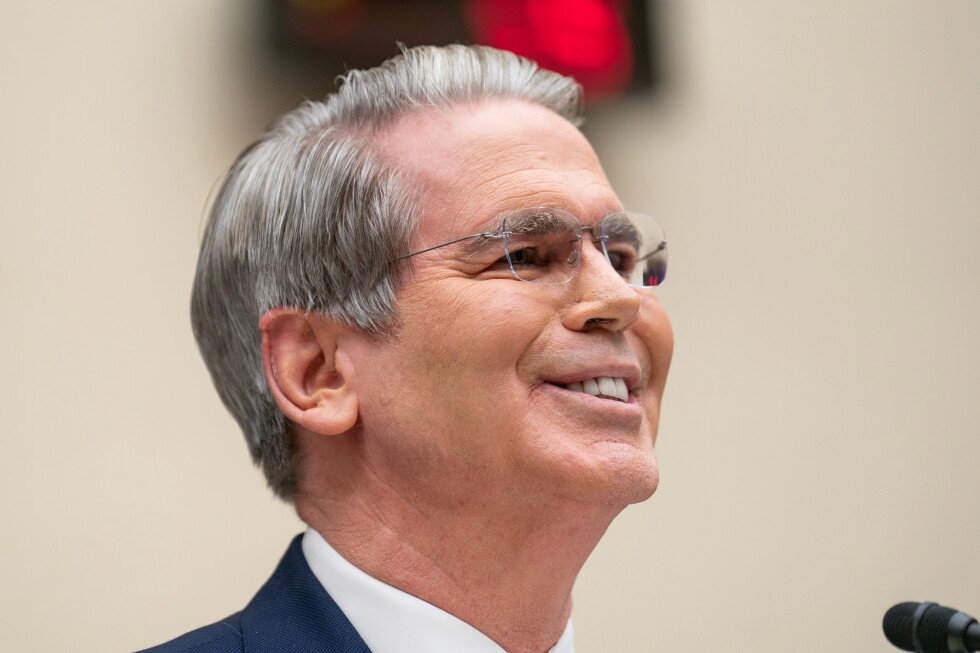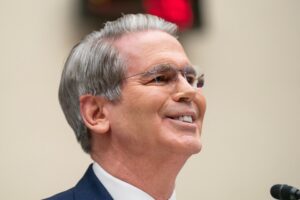The Dictatorship
Trump’s foreign policy vision is coming into focus. And it’s worse than we may have imagined.

This is an adapted excerpt from the Feb. 12 episode of “All In with Chris Hayes.”
Donald Trump’s foreign policy vision is starting to come into focus — and it is worse and more dangerous than you may have imagined. The president and his MAGA allies appear poised to rapidly undo the American-led global, democratic order.
The unraveling began Wednesday with an announcement from Trump’s secretary of defense, Pete Hegseth, that America was pulling back from defending its allies.
These institutions and orders were established precisely because of the competitive, conquering aspirations of rising empires and fascist regimes.
“We must start by recognizing that returning to Ukraine’s pre-2014 borders is an unrealistic objective,” Hegseth said during a meeting of the Ukraine Defense Contact Group in Brussels on Wednesday. “Chasing this illusionary goal will only prolong the war and cause more suffering.”
“The United States does not believe that NATO membership for Ukraine is a realistic outcome of a negotiated settlement,” Hegseth added. “We’re also here today to directly and unambiguously express that stark strategic realities prevent the United States of America from being primarily focused on the security of Europe.”
On Thursday, Hegseth attempted to walk some of those comments back, telling reporters that “everything is on the table” in negotiations between Ukraine and Russia.
But part of the reason this type of rhetoric is so dangerous has to do with what NATO stands for and when it was created. These institutions and orders were established after World War II precisely because of the competitive, conquering aspirations of rising empires and fascist regimes throughout the world. NATO was formed by the U.S. 76 years ago to pledge that an attack on one member was an attack on all — what is known as Article 5. It started with 12 countries and now has 32 members.
The only time Article 5 was invoked was when all the allies joined together in one fight: when they all came to the United States’ aid after Sept. 11, 2001, and pledged their troops and materiel to the war in Afghanistan. Canadians, Italians, Danes, Spaniards, Norwegians, Estonians, Latvians and more gave their lives for the U.S.’ war on terror. Because that is how alliances work. Allies are supposed to have each other’s back. At least they were before Wednesday.
Not long after Hegseth spoke, Senate Republicans voted to confirm Tulsi Gabbard as the next director of national intelligence. Gabbard is a policy lightweight whose greatest foreign policy achievement was visiting Syrian dictator Bashar al-Assad, along with his top clericwho threatened suicide bombings in the United States. (Last month, Gabbard told senators she was unaware of the cleric’s threat at the time of their meeting.) She’s also been accused of siding with Russia and President Vladimir Putin over the U.S. intelligence consensus. But all that sat just fine with every Republican in the Senate except Sen. Mitch McConnell of Kentucky, who joined 47 Democrats and independents in voting against Gabbard.
At almost the same moment Gabbard was being confirmed Wednesday, Trump was getting off the phone with another international leader: Putin. Trump took to social media to break the news about what he called a “highly productive” call with Putin, writingin part:
we both agreed, we want to stop the millions of deaths taking place in the War with Russia/Ukraine. President Putin even used my very strong Campaign motto of, ‘COMMON SENSE.’ We both believe very strongly in it. We agreed to work together, very closely, including visiting each other’s Nations.
The glaring thing here is that the country on the receiving end of Russia’s aggression, Ukraine, did not seem to be looped in on developments relating to their future. Trump even dodged a reporter’s question on whether he considered Ukraine an “equal member” in the negotiation process.
We should be clear about what we’re watching: Trump is disassembling the U.S.-led international order to the benefit of the global authoritarians he envies and admires.
Politically, Trump has succeeded in selling isolationism to a lot of Americans. It is true that our leading role in the world has been largely a product of a bipartisan elite consensus and sometimes it feels pretty removed from democratic majorities, who tend to believe America gives out too much foreign aid and “polices” the world. Believe me, I’ve spent two decades critiquing the many shortcomings and downright cruelties of that same order. But however imperfect that order is, what Trump wants to replace it with is far, far worse.
The current international order was created by the U.S. and its allies to prevent the world from the unthinkable. When there were rising tensions between the victorious nuclear superpowers, institutions like NATO and the United Nations were formed in part to prevent the Cold War from becoming a nuclear holocaust.
But there’s another reason Trump is eager to jettison the old order in favor of an anarchic world in which strong countries do what they want. When you hear Putin’s claim that Ukrainians are really just misguided Russians, you can hear echoes of the Nazis’ claim that Austrians and Czechs were just Germans. What Trump is doing now is sending the message to everyone around the world that not only is territorial acquisition by force OK but the U.S. is interested in pursuing it: from Greenland to the Panama Canal to Canada as the 51st state to envisioning the Gaza Strip as an American-owned development project.
The emerging Trump doctrine appears to be that democracies are weak and soft and that we will side with autocracies over them. It’s disastrous. Not just for America’s place in the world but also for the cause of peace.
The emerging Trump doctrine appears to be that democracies are weak and soft and that we will side with autocracies over them.
The idea that the path to peace is to throw overboard democracies in favor of authoritarian regimes is a dangerous idea. And it’s the fundamental throughline of Trump’s worldview. He seems to hate our allies and to love our enemies, possibly because our enemies see the world as he does: transactional and ripe for the picking.
With loyal, morally flexible subordinates like Hegseth and Gabbard, Trump is essentially reorienting American politics as friendly to dictators and authoritarian regimes and fundamentally hostile to democracies. It is shaping up to be the most radical transformation of America’s role in the world since Franklin D. Roosevelt — and it will likely not end well.

Chris Hayes hosts “All In with Chris Hayes”at 8 p.m. ET Monday through Friday on BLN. He is the editor-at-large at The Nation. A former fellow at Harvard University’s Edmond J. Safra Foundation Center for Ethics, Hayes was a Bernard Schwartz Fellow at the New America Foundation. His latest book is”A Colony in a Nation” (W. W. Norton).
Allison Detzel
contributed
.
The Dictatorship
Treasury Secretary Bessent’s testimony descends into shouting matches

WASHINGTON (AP) — A hearing about oversight of the U.S. financial system devolved into insults several times Wednesday as Treasury Secretary Scott Bessent clashed with Democratic lawmakers over fiscal policy, the business dealings of the Trump family and other issues.
Appearances by treasury secretaries on Capitol Hill are more typically known for staid exchanges over economic policy than for political theater, but Wednesday’s hearing of the House Financial Services Committee hearing featured several fiery exchanges between the Republican Cabinet member and Democrats, with Bessent even lobbing insults back to the lawmakers.
Bessent called Rep. Sylvia Garcia “confused” when she questioned how undocumented immigrants could affect housing affordability across the country, prompting the Texas Democrat to snap back, “Don’t be demeaning to me, alright?”
Bessent later mocked a question from Rep. Stephen Lynch, D-Mass., about shuttered investigations into cryptocurrency firms. Lynch expressed frustration with Bessent’s interruptions, saying, “Mister Chairman, the answers have to be responsive if we are going to have a serious hearing.”
Bessent replied, “Well, the questions have to be serious.”
After a back-and-forth over whether tariffs cause inflation or one-time price increases for consumers, California Democratic Rep. Maxine Waters asked committee leaders to intervene with Bessent: “Can someone shut him up?”
And in a fiery exchange with Rep. Gregory Meeks over the Abu Dhabi royal family’s investment into the Trump family’s World Liberty Financial cryptocurrency firm last year, the New York Democrat dropped an F-bomb as he shouted at Bessent: “Stop covering for the president! Stop being a flunky!”
The Treasury Department did not immediately respond to a request for comment on the fireworks.
Bessent’s performance was “not a role you typically see a treasury secretary play,” said Graham Steele, a former assistant secretary for financial institutions under Biden-era Treasury Secretary Janet Yellen. The department has traditionally “been removed from some of the day-to-day, hand-to-hand political combat,” Steele said in an interview.
He recalled his former boss having tense exchanges over climate change and policy issues with Republican lawmakers during committee hearings, but the exchanges were not personal, he said, noting treasury secretaries have to strike a “delicate balance” of working with the White House while safeguarding the “economic stature” of the country internationally.
In recent months, Bessent has ratcheted up his insults when it comes to Democratic leaders.
He has called California Gov. Gavin Newsom “economically illiterate,” compared him to the fictional serial killer Patrick Bateman, and called him “a brontosaurus with a brain the size of a walnut.” He has on several occasions called Massachusetts Sen. Elizabeth Warren an “American Peronist” after she told American financial institutions not to finance the Trump administration’s massive support package for Argentina.
Bessent’s combativeness is, in part, a sign of the times, said David Lublin, chair of the Department of Government at American University’s School of Public Affairs.
“President Trump has shown he likes belligerence and he likes nominees and others who defend him vociferously,” Lublin told The Associated Press.
“It’s hard to say that this is unusual for this political environment. What used to be the normal modicum of respect for Congress has frayed to the point of vanishing,” Lublin said.
What was unusual, in Lublin’s view, was for Bessent to reveal his thoughts on monetary policy — normally the purview of the Federal Reserve — and his insistence that Trump has the right to interfere with the decision-making of the central bank. “You have a cabinet secretary defending the president’s efforts to erode institutions,” Lublin said.
On Thursday, Bessent will get another opportunity to spar with lawmakers. He is scheduled to appear before the Senate Banking, Housing and Urban Affairs Committee on the same topic: the annual report by the Financial Stability Oversight Council, which Bessent leads.
The Dictatorship
DHS lawyer removed after telling judge ‘this job sucks’

WASHINGTON (AP) — A government lawyer who told a judge that her job “sucks” during a court hearing stemming from the Trump administration’s immigration enforcement surge in Minnesota has been removed from her Justice Department post, according to a person familiar with the matter.
Julie Le had been working for the Justice Department on a detail, but the U.S. attorney in Minnesota ended her assignment after her comments in court on Tuesday, the person said. The person spoke on the condition of anonymity to discuss a personnel matter. She had been working for U.S. Immigration and Customs Enforcement before the temporary assignment.
At a hearing Tuesday in St. Paul, Minnesota, for several immigration cases, Le told U.S. District Judge Jerry Blackwell that she wishes he could hold her in contempt of court “so that I can have a full 24 hours of sleep.”
“What do you want me to do? The system sucks. This job sucks. And I am trying every breath that I have so that I can get you what you need,” Le said, according to a transcript.
Le’s extraordinary remarks reflect the intense strain that has been placed on the federal court system since President Donald Trump returned to the White House a year ago with a promise to carry out mass deportations. ICE officials have said the surge in Minnesota has become its largest-ever immigration operation since ramping up in early January.
Several prosecutors have left the U.S. Attorney’s office in Minnesota amid frustration with the immigration enforcement surge and the Justice Department’s response to fatal shootings of two civilians by federal agents. Le was assigned at least 88 cases in less than a month, according to online court records.
Blackwell told Le that the volume of cases isn’t an excuse for disregarding court orders. He expressed concern that people arrested in immigration enforcement operations are routinely jailed for days after judges have ordered their release from custody.
“And I hear the concerns about all the energy that this is causing the DOJ to expend, but, with respect, some of it is of your own making by not complying with orders,” the judge told Le.
Le said she was working for the Department of Homeland Security as an ICE attorney in immigration court before she “stupidly” volunteered to work the detail in Minnesota. Le told the judge that she wasn’t properly trained for the assignment. She said she wanted to resign from the job but couldn’t get a replacement.
“Fixing a system, a broken system, I don’t have a magic button to do it. I don’t have the power or the voice to do it,” she said.
Homeland Security Assistant Secretary Tricia McLaughlin said Le was a probationary attorney.
“This conduct is unprofessional and unbecoming of an ICE attorney in abandoning her obligation to act with commitment, dedication, and zeal to the interests of the United States Government,” McLaughlin said in a statement.
Le and the U.S. Attorney’s office in Minnesota didn’t immediately respond to emails seeking comment.
Kira Kelley, an attorney who represented two petitioners at the hearing, said the flood of immigration petitions is necessary because “so many people being detained without any semblance of a lawful basis.”
“And there’s no indication here that any new systems or bolded e-mails or any instructions to ICE are going to fix any of this,” she added.
The Dictatorship
‘Monster’s Paradise’ lampooning Trump has world premiere at Hamburg Opera

HAMBURG, Germany (AP) — Tobias Kratzer spoke in disbelief ahead of the world premiere of “Monster’s Paradise” by Olga Neuwirth and Elfriede Jelinek, which features a gluttonous, ravenous, insatiable President-King, lampooning U.S. President Donald Trump.
“The metaphor has become a reality,” the Hamburg State Opera artistic director said in his office Sunday morning. “I’m really hoping in — what is it, eight hours? — the piece is not completely outdated because up until now it has always gone closer and closer to not being a satire but being reality.”
Jelinek, 79 and winner of the 2004 Nobel Prize in Literature, collaborated with Neuwirth for the first time in two decades, the Austrian duo combining on a German-language libretto. The 57-year-old Neuwirth won the 2022 Grawemeyer Award for Music Composition, three years after she became the first woman composer with a work presented at the Vienna State Opera.
Chorus members dressed as zombies and roamed the foyers before the opera and during the intermission, along with Disney-styled princesses and dancing hot dogs. The opera began with a Las Vegas-style LED sign and action on a passerelle.
A 19th-century satire was the starting point
Alfred Jarry’s 1896 play “Ubu Roi” was the inspiration, a profane, scatological work that had a one-performance run in Paris, cut short by an angry audience response.
Aspects of Jarry’s King Wenceslas and Ubu characters were adapted into The President-King for what Neuwirth and Jelinek call a Grand Guignol opera, which has a six-performance run through Feb. 19. It moves to the Zurich Opera from March 8 to April 12 and next season to Austria’s Oper Graz. An audio recording is planned.
The President-King entered in a gilded Oval Office with a Coca-Cola filled refrigerator. A golden crown sat on his desk along with a red button that jettisoned visitors such as an Elvis Presley impersonator in the manner of a TV game show as a trio of red X-shaped lights flashed. A woman resembling Melania Trump lurked in the background.
“I have long known Jarry’s play, but when Trump came to power, I instantly thought of it,” Jelinek said in an emailed response to questions translated from German.
Vampi and Bampi, a pair of pun-prone vampires sung by Sarah Defrise and Kristina Stanek, are avatars of the authors during five scenes that unfold over 2 hours, 45 minutes, and they frame action in the manner of Wagner’s Rheinmaidens and Norns. The President-King (sung by Georg Nigl) is opposed by Gorgonzilla (Anna Clementi), a monster spawned by a nuclear accident. One of the early titles was “Godzilla,” but it was changed because of a rights issue.
Mickey and Tuckey, the President-King’s adjutants sung by countertenors Andrew Watts and Eric Jurenas, were patterned after Elon Musk and Mark Zuckerberg, according to Kratzer, who directed the production. They sing lines such as: “Nobody has such high numbers as you.”
Charlotte Rampling, in several projected videos, portrays a character called The Goddess who defends nature and civilization. Gorgonzilla devours the The President-King, but the creature also becomes an authoritarian. The opera ends with video of the vampires drifting on a platform along the Elbe while playing Schubert on a Bösendorfer piano, worrying the Earth has been destroyed by its leaders.
Outlandish portrayal of Trump-like character
The President-King grows to huge dimensions while wearing a diaper and golden necktie in Rainer Sellmaier’s set and costume design, and he plants a golf club on Gorgonzilla’s rock, much like the White House AI photo of Trump landing on Greenland. The President-King boasts of winning “Ohoho” and “Tuxus,” and his lead in “Pennsilfania” isn’t even close.
Wearing Kermit the Frog and Miss Piggy masks, the vampires attack The President-King with sledgehammers and saws, which have no impact. The one resembling Miss Piggy mimics missing with a rifle, prompting The President-King to raise a fist in defiance.
“People of power are always afraid of humor,” Neuwirth said. “For example, Hitler was so afraid of Charlie Chaplin’s `The (Great) Dictator’ — he watched it secretly in his room in Berlin — because they are afraid to be laughed at. They have this ego, which is not allowed to be questioned.”
Neuwirth composed for a Mozart-sized orchestra adding an electric guitar and a drum kit, as characters often used Sprechstimme — spoken-word singing. Conductor Titus Engle melded Neuwirth’s many musical genres.
“I’m not playing the American president, but it’s very close,” Nigl said. “I am playing a misogynist. I am playing a braggart. I am playing a fraudster, a despiser.”
Nigl portrayed Russian President Vladimir Putin last year in Gordon Kampe’s “Die Kreide im Mund des Wolfs (The Chalk in the Wolf’s Mouth).” Nigl said his most important words in this opera are when he sings: “He who has millions does not need voters.”
Trump’s reaction is on their minds
Neuwirth vowed “I’m never going to write an opera again,” adding she will reveal her reason at a later date.
She is aware she could face repercussions from the U.S. administration.
“I’m kind of a little bit afraid because I want to still enter the United States,” she said.
Jelinek remained unconcerned.
“I am not afraid. I am a small, unimportant European woman,” she wrote in her emailed responses.
-

 The Dictatorship12 months ago
The Dictatorship12 months agoLuigi Mangione acknowledges public support in first official statement since arrest
-

 The Dictatorship5 months ago
The Dictatorship5 months agoMike Johnson sums up the GOP’s arrogant position on military occupation with two words
-

 Politics12 months ago
Politics12 months agoFormer ‘Squad’ members launching ‘Bowman and Bush’ YouTube show
-

 Politics12 months ago
Politics12 months agoBlue Light News’s Editorial Director Ryan Hutchins speaks at Blue Light News’s 2025 Governors Summit
-

 The Dictatorship12 months ago
The Dictatorship12 months agoPete Hegseth’s tenure at the Pentagon goes from bad to worse
-

 Politics12 months ago
Politics12 months agoFormer Kentucky AG Daniel Cameron launches Senate bid
-
Uncategorized1 year ago
Bob Good to step down as Freedom Caucus chair this week
-

 Politics10 months ago
Politics10 months agoDemocrat challenging Joni Ernst: I want to ‘tear down’ party, ‘build it back up’





